|
How will extending statute of limitations in sex abuse cases affect New Jersey?
By Deena Yellin
[with video] The ink was still wet on the law signed by Gov. Phil Murphy last Monday extending the statute of limitations for victims of child sexual abuse when it was put into use: A former altar boy announced Tuesday morning that he was filing a lawsuit against the Diocese of Camden and his former parish, alleging he was sexually abused as a child by the late Rev. Brendan Sullivan, a priest at St. James Roman Catholic Church in Ventnor City. More lawsuits are likely to come. The question is whether there will be a flood or more like a trickle. New York state passed a similar law in February and is facing a similar unknown. The Catholic Church and insurance companies, which long opposed the measures in both states, have asserted that the new laws will open the floodgates to anyone who wants to make a claim, making religious groups and non-profits more vulnerable to financial losses. Some groups, like the Trenton-based New Jersey Catholic Conference, have argued that the law would interfere with the church's effort to establish a compensation program for the victims. The state Office of Legislative Services wrote in March that it expects that "the bill will expose the state, school districts and local units of government to civil claims that may result in added legal defense expenditures and substantial settlements and judgments against affected governments." But sexual abuse advocates and legal experts last week rejected the notion that the New Jersey courts will be inundated with child sexual abuse cases. "There's all the old feelings of shame and guilt as well as the fear of not being believed," said Joe Capozzi, a sexual abuse advocate who said he was abused by his parish priest, the Rev. Peter Cheplic, at St. Matthew's Church in Ridgefield when he was a child. "It's not like they will automatically cut you a check if you come forward." Capozzi, who reached a settlement with the Newark Archdiocese years ago, had been vigorously advocating for New Jersey to pass the statute of limitations law because he believes it will help other victims to heal, and will help bring the truth to light. New Jersey's law allows victims to file suits until age 55, or within seven years of realizing that abuse caused them harm. In addition, victims who were previously unable to bring their abuser to court will now have two years to do so. The measure takes effect on Dec. 1. the New York law extends the statute of limitations to allow charges to be filed against sexual abusers of children until victims turn 28, up from the current 23. It also allows victims to seek civil action against their abusers and institutions that enabled them until age 55. And it opens up a one-year, one-time period to allow all victims to seek civil action, regardless of how long ago the abuse occurred. Joe Zwilling, a spokesman for the Archdioceses of New York, said it's too early to determine the impact of the new law. "The window doesn't open in New York state until August, so we won't know the full extent of the effect until that happens," he said Tuesday. A spokeswoman from the Newark Archdiocese declined to criticize the new law Wednesday, asserting that its impact "remains to be seen." "The Catholic community is committed to the healing of those harmed and recognizes the need to restore justice for the victims of sexual abuse," she said. "That is why the Independent Victims Compensation Program was established by the five dioceses in New Jersey. Our hope is that victims would seek compensation through that process — specifically those who, as minors, were abused by ministers of the church." Robert Hoatson, a former New Jersey priest and an advocate for sexual abuse victims, said he is not convinced that abuse survivors will flock to the courts. "Sexual abuse victims can only come forward when they are ready," he said. "Many will need a long time to process that they have a way to hold their abusers accountable, and their realization is no guarantee that they will ever take advantage of the law." A case in point is Delaware, which passed a similar measure in 2007 and has seen the highest number of lawsuits of any state, with 1,175. California, which was the first state in the country to pass such a law in 2003, had 1,150. "The opponents to the law said that it would create a flood of lawsuits that would be impossible to handle, but the truth is that it hasn't been an overwhelming number in any state," said Marci Hamilton, a professor at the University of Pennsylvania and the CEO of CHILD USA, a think tank that seeks to prevent child abuse. She pointed out that there are numerous barriers to people bringing their abusers to court. "Many of the victims have nobody to sue — their abuser could be a babysitter or someone who they don't know where they are," she said. "For them, the ability to file a lawsuit is something that would not help them. Others are doing fine in their lives and so they choose not to." The people most likely to go to court are those who have suffered greatly and need the compensation to be able to function, she said. Otherwise, "There's every reason not to come forward," Hamilton said. "It's one of those things you don't want to tell everyone." The advantage of going to court, said Mark Crawford, a sexual abuse victim and the New Jersey director of SNAP (Survivors Network for Those Abused by Priests), is that it forces the institution to hand over all documents about the abuser and other victims. "It brings the whole truth to light," he said, adding that he knows of several victims who hope to take advantage of the new law by bringing their abusers to court. "Going to the church compensation fund means you just tell your story and get cash. But at least they have the choice now." Legal experts said they are confident New Jersey courts will be able to handle however many cases are brought. David Inscho, a partner at Kline and Spector in Philadelphia, which has handled numerous child sexual abuse cases, said that even if many people come forward, "The courts in New Jersey are very capable of handling the claims. This is not going to be an explosion of claims that will cause the civil justice system to buckle." Mitchell Garabedian, a Boston attorney who has handled numerous clergy abuse cases and was portrayed in the movie "Spotlight," said steps can be taken to handle the influx of cases. He said, for example, "special litigation courts can be created for sexual abuse cases; courts can also designate sexual abuse cases as either a class action, mass tort and/or consolidated for discovery purposes. Specific judges and staff can be assigned to work on sexual abuse cases." Garabedian added that when he was co-counsel for six plaintiffs who sued the Archdiocese of Newark, alleging they were abused by the Rev. Michael Mitch Walters in the 1980s and 1990s, the judge consolidated the six cases for discovery purposes.
|
.
Any original material on these pages is copyright © BishopAccountability.org 2004. Reproduce freely with attribution.


